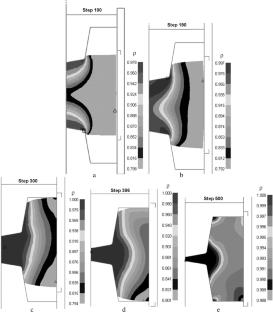Evolution of the Stress–Strain State of Porous Workpieces in Hot Extrusion Forging to Produce Axisymmetric Parts with an Axial Hole
Abstract
The evolution of stress-strain state and the distribution of temperature and relative density throughout a porous workpiece subjected to hot extrusion forging to produce axisymmetric parts with an axial hole was studied by computer simulation. The hot forging process was modeled using the finite element method employing the DEFORM 2D/3D software package. Analysis of the simulation results showed that the region of strains, stresses, and relative densities formed under the conical protrusions of the punches in the initial stages of the process, and these parameters decreased radially from the center of the workpiece to its periphery. As the axial strain increased with further deformation, the region of elevated stresses and densities extended deeper into the material, spreading from the center of the workpiece to its periphery. In the final stage, after the die cavity was filled with the forged material, the relative densities and stress intensities averaged over the workpiece, while the strain intensity noticeably decreased in the radial direction from the center to the periphery following additional compaction. This was explained by the deformation that occurred in the final stage when the forged material filled the pore volume in the additional compaction process after the die cavity was filled. The forging force increased sharply when the die cavity was filled fully and the material underwent additional compaction but increased monotonically in the initial stages of the process.


| 公司名称 | 产品信息 | 采购帮参考价格 |
|---|
 求助内容:
求助内容: 应助结果提醒方式:
应助结果提醒方式:


